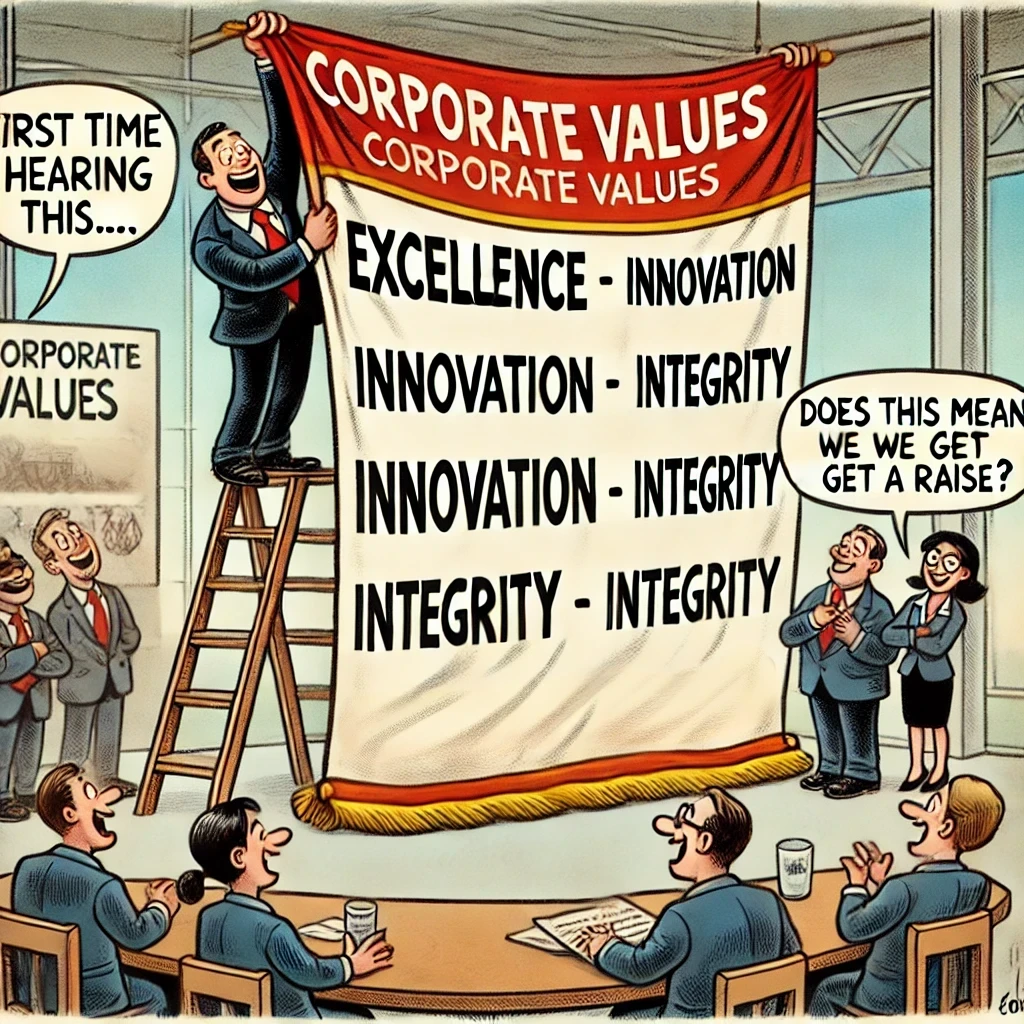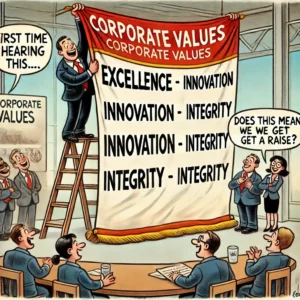
Seasonal Sales Strategy: Make the Most of Spring
Spring is a strategic time to boost your business. Discover how to align your sales efforts with seasonal cycles and turn the transition into a growth driver.
By Jean-Charles Spanelis – February 17, 2025

At Finelis Coaching, we observe it every day: corporate values are often highlighted in speeches, displayed on websites, and included in internal charters. But beyond words, what is their true role in commercial performance?
Are they a strategic lever, capable of strengthening internal cohesion and boosting results? Or just a marketing tool, used to attract clients and employees without real impact on the ground?
In this article, we will explore:
✅ The impact of values on performance and team engagement
✅ The risks of “purpose washing” and overcommunication without action
✅ How to turn your values into a driver of sustainable growth
We share our expertise and concrete solutions to ensure that your values become a true commercial and strategic asset. 🚀
So, are your values truly embodied or just displayed? 💡
Corporate values are not just a slogan meant to reassure clients and investors. When truly embodied, they deeply influence internal culture, team motivation, and commercial performance. But how can they become a growth driver rather than just a communication tool?
Companies that integrate their values into their daily operations see higher employee engagement. An employee who shares the company’s values is more committed, productive, and more likely to stay loyal to their employer.
🔹 A Strong Corporate Culture for Better Performance
Studies show that companies that embed their values into their operations achieve better results. A work environment based on clear principles—transparency, innovation, excellence, commitment—builds trust, reduces turnover, and boosts motivation.
🔹 Real-Life Examples: Companies That Succeed Through Their Values
Some companies stand out due to the strong alignment between their values and their practices.
Patagonia, for instance, has built its success on strong environmental commitments, not only by producing eco-friendly clothing but also by encouraging its customers to consume less. The result? Exceptional customer loyalty.
Michelin, with its culture of innovation and excellence, relies on continuous improvement values that are reflected in both its products and management approach.
🔹 Values After the Crisis: A Lever for Adaptation
The health crisis has shifted both employee and consumer expectations. Adaptability, flexibility, and employee well-being have become top priorities.
👉 Companies that have managed to adapt while staying true to their values have strengthened their competitiveness. This is what we analyzed in our article on post-Covid commercial strategies.
Values should not only be lived internally; they must also be reflected in the sales strategy.
In a traditional model, sales often rely on a transactional approach, where the main goal is quick conversion. While this model can be effective, it does not encourage customer loyalty or brand image.
Today, modern sales strategies are based on a customer-centric approach, where values play a key role in the customer experience:
✔️ Active listening to offer tailored solutions.
✔️ Long-term trust instead of opportunistic selling.
✔️ Consistency between commercial messaging and corporate identity.
This fundamental difference is what we analyze in our article on traditional vs. modern sales methods.
👉 A company that values innovation will highlight demonstrations and free trials to showcase the quality of its products.
👉 A company that promotes transparency will clearly communicate pricing, margins, and sales conditions.
👉 A brand focused on sustainability will adapt its strategy by offering repair services or recyclable products.
In short, values are not a commercial obstacle, but rather a powerful differentiator when integrated into the sales strategy.
In the next section, we will see how misused or exaggerated values can, on the contrary, harm a company’s credibility and performance.
While corporate values can be a powerful performance lever when genuinely embodied, they can also become a source of distrust when they are merely a facade. Too often, brands use them purely for marketing purposes, without truly integrating them into their operations. The result? A loss of credibility that impacts both brand image and customer loyalty.
We’ve all seen companies loudly proclaim their commitment to environmental, ethical, or diversity initiatives… while engaging in practices that contradict these stated values. This phenomenon has a name: purpose washing.
🔹 When Displaying Values Backfires on a Company
Purpose washing refers to companies that use trendy values without genuine implementation. Consumers today are more informed and demanding, making this inconsistency increasingly visible and damaging.
🔹 The Negative Impact on Reputation and Trust
👉 A company caught purpose washing risks far more than just a bad buzz. Loss of trust can be irreversible, affecting both customer relationships and employer attractiveness. Consumers now punish inconsistencies by turning to more authentic brands.
If promoting unapplied values is problematic, overcommunicating about them can also harm a company’s credibility.
When a company overemphasizes its commitments without providing proof, its message loses impact. Customers and partners now expect concrete actions, not just words.
Some warning signs of poorly executed value marketing:
✔️ Empty, generic language (e.g., “We are a responsible and committed company” without real evidence).
✔️ An overuse of values in external communication, with no real impact on customer experience.
✔️ Contradictions between messaging and reality (e.g., a company advocating diversity but with an all-male executive team).
Rather than exploiting values, companies should fully integrate them into customer relations and commercial strategy. A customer-centric approach, which genuinely places customer needs at the core of the process, is far more effective than purely declarative communication.
📌 Discover how to adopt this strategy in our article: Customer-Centric Strategy: Retain Customers and Boost Sales.
In the final section of this article, we will explore how to transform values into a true growth driver by aligning communication, sales strategy, and concrete actions.
Corporate values should not remain mere communication tools. When they are coherently integrated into internal and commercial practices, they become a powerful lever for growth and differentiation. But how can they be made tangible and impactful over time?
A company that wants to build credibility around its values must go beyond intentions and statements. This requires concrete actions and systematic implementation within its organization and commercial strategy.
Values should guide all strategic and operational decisions. Here are some key levers:
✔️ Recruitment and management: Prioritize employees who share the same values and foster a culture that embodies them daily.
✔️ Products and services: Ensure they reflect the stated commitments (e.g., a brand advocating for sustainability must reduce its carbon footprint throughout its supply chain).
✔️ Customer experience: Offer a purchasing journey aligned with company values (transparency, accessibility, ethical engagement).
A company that aligns its values with its commercial strategy builds a trust-based customer relationship, fostering loyalty and sustainable sales growth.
A company cannot simply declare its values—they must be embodied by every employee. This requires:
🔹 Regular training to align team practices with corporate commitments.
🔹 Awareness initiatives for sales teams, enabling them to integrate values into their approach and client interactions.
🔹 A culture of leadership by example, where managers lead the way by embodying the values they promote.
While integrating corporate values is a key challenge, structuring it internally can be complex, especially for SMEs and growing companies. Sales and marketing outsourcing provides an effective solution to build a values-driven strategy.
✅ An external perspective to clarify values and translate them into actionable strategies.
✅ Expertise in commercial strategy to adjust positioning and messaging.
✅ Support in team training and process optimization.
By entrusting part of their business development to outsourcing experts, companies can gain consistency and efficiency while staying true to their identity.
📌 Discover how Finelis Outsourcing Marketing can support you:
👉 https://www.finelis.com/fr/outsourcing-marketing/
Corporate values are a significant asset when aligned with a coherent strategy. They should not be just words on a website, but rather a driver of engagement, performance, and differentiation.
At Finelis Coaching, we help companies implement sales strategies aligned with their values, turning them into a true growth lever.
💡 And you, how do you bring your values to life in your company every day?
📩 Need support to structure your approach? Contact us!
If you’re ready to take steps to grow your sales and are wondering which path to take is best—hiring, outsourcing, or training—we’re here to help.

Spring is a strategic time to boost your business. Discover how to align your sales efforts with seasonal cycles and turn the transition into a growth driver.

Attending a trade show is a powerful business opportunity. Discover how to maximize your impact with strong preparation, engaging techniques, and structured follow-ups.

Expanding internationally means adapting your company’s DNA without losing its essence. Learn how to structure your offer, refine your message, and build strong partnerships for success.

Are corporate values truly a performance driver, or just a marketing argument? When aligned with a coherent sales strategy, they become a powerful lever for growth and customer loyalty. Discover how to structure an effective approach to bring meaning to your values and turn them into a real asset.

Discover how to reinvent your sales strategies after Covid with a hybrid approach that blends tradition and digitalization. Learn how to outsource effectively, adopt a customer-centric approach, and develop essential sales skills to maximize your performance.
Innovation is a key lever for turning challenges into opportunities. With logistics solutions like KWiiD and Hipli, your business can reduce costs, enhance environmental commitment, and maximize commercial performance.